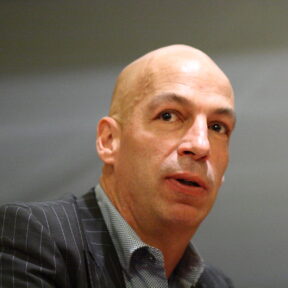
Michael Warner
: Photo from Wikimedia Commons / Author of Photo: Sage RossOverview
* Professor of English at Rutgers University
* A leading writer and thinker in the field of “queer theory”
* Advocates anonyomous, public homosexual encounters
* A founder of Sex Panic, an organization that aimed to prevent the closing of bathhouses and other institutions that catered to promiscuous, anonymous homosexual sex.
* “The phenomenology of a sex club encounter,” he says, “is an experience of world making. It’s an experience of being connected not just to this person but to potentially limitless numbers of people, and that is why it’s important that it be with a stranger.”
Born on September 9, 1958, Michael Warner is a Professor of English at Rutgers University. He received his B.A. from Oral Roberts University and his Ph.D. from Johns Hopkins University. Warner’s specialty is 19th Century American Literature, but he is best known for the books he has written and edited in the field of “Queer Studies,” including Fear Of A Queer Planet (1993) and The Trouble With Normal (2000). Professor Warner teaches a graduate course in Queer Theory and is considered one of the most important academic theorists in that discipline. One of the leading radicals of the “Gay Rights” movement, he describes himself as an opponent of “not just the normal behavior of the social, but the idea of normal behavior.”
The essence of queer theory rejects the view that sexuality is a universal human impulse; that sexual desire can exist apart from history and culture; and that any sexual inclination, including heterosexuality, is inherently natural or normal. “What identity,” Warner writes, “encompasses queer girls who fuck queer boys with strap-ons, or FTMs (female-to-male transsexuals) who think of themselves as queer, FTMs who think of themselves as straights, or FTMs for whom life is a project of transition and screw the categories anyway?” Warner wants to “overthrow” what he calls “hetero-normativity,” the very idea of the normal, which he regards as a form of “oppression.”
Warner does not view gay marriage or adoption rights as ideals for which homosexuals should fight. On the contrary, the professor has been an outspoken critic of such crusades, finding them to be demeaning attempts to “normalize” the gay experience. As such, he reasons, they can only serve to destroy the queer lifestyle, which for Warner necessarily includes promiscuous, unprotected, and public sex acts — in bathhouses and elsewhere.
In 2000, Caleb Crain, a former editor of Lingua Franca, told the New York Association of Scholars for Reasoned Discourse in a Free Society that Warner probably had done more than anyone else to turn queer theory into a movement. In 1993, for instance, Warner edited an anthology titled Fear of a Queer Planet. In 1995, he and the University of Chicago’s Lauren Berlant wrote a guest column called ‘What Does Queer Theory Teach Us about X?’ for the official journal of the Modern Language Association, the PMLA. And in 1997, during a resurgence of HIV/AIDS and other sexually transmitted diseases, particularly among gay men, Warner and other queer theorists started an activist organization in New York City called Sex Panic.
Sex Panic aimed to counter measures taken by law enforcement and policy makers to shut down bathhouses and other institutions that catered to promiscuous, anonymous homosexual sex. At the National Sex Panic Conference — held in San Diego, November 13-15, 1997 — activists gathered to “discuss the emerging culture war within the gay community.” A Sex Panic press release on the conference expressed concern about the “increased attack against marginalized sexualities including the harassment and closure of sex clubs, bathhouses and public sex spaces; racist selective enforcement and policing of lesbian/gay bars; anti-sex AIDS activism and education campaigns; increased policing of and attacks on sex workers; and the burgeoning demonizing of sex and party cultures appearing in current gay men’s writings.”
“The phenomenology of a sex club encounter,” Warner writes, “is an experience of world making. It’s an experience of being connected not just to this person but to potentially limitless numbers of people, and that is why it’s important that it be with a stranger. Sex with a stranger is like a metonym.”